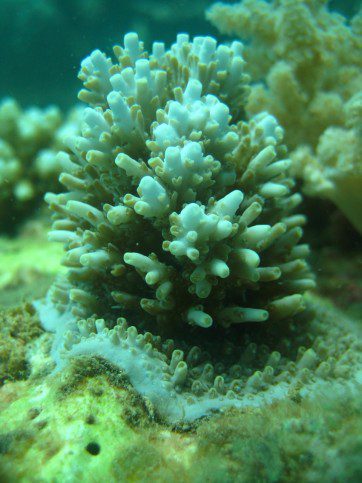By Dr Yann Frejaville, Fisheries Scientist, Madagascar
Acquiring better knowledge of the ecosystems we belong to is a clear goal for those who work towards the sustainable use of natural resources. Coral Reefs are incredibly complex ecosystems which we are only just beginning to understand. They are also extremely sensitive; changes in the environment (whether anthropogenic or natural) can trigger chain reactions within the reef which can cause damage that takes decades to recover from.

Coral reef surveys are gathering data to improve our understanding of the Barren Isles marine ecosystem. Already results are showing a very high abundance and diversity of corals from this genus Acropora, the largest and most diverse coral genus, but also one of the most vulnerable to the effects of climate change
Studying the dynamics of fish populations on coral reefs is crucial for the purpose of conservation. Indeed, coral reef fishes are a major source of food and income for numerous coastal communities of Madagascar and are highly vulnerable to habitat degradation, pollution, destructive fishing and overexploitation. Furthermore, the particular ecology of coral reef fish, including the pelagic larval development stage, causes high levels of mortality in juvenile fish – before they’re even available for fishing. All this explains why this resource is relatively fragile.

Will the Barren Isles surveys reveal an abundance of large fish such as the blue marlin (Makaira mazara)?
However, trying to discover and understand the variations in the populations of coral reef fish presents many challenges: difficulties in observing them in situ, highly variable distributions, abundance influenced by natural cycles potentially clouding the impact of anthropogenic fishing pressure… the list goes on.
Fortunately, methods and tools have been developed, allowing us to observe, identify, count and assess the size and weight of every fish observed during SCUBA surveys. The data collected is precious as it can be interpreted with statistical tools in order to reveal trends (early signs of overexploitation, effects of ongoing conservation efforts etc.) and explain the environmental factors favorable to abundant and healthy fish populations. These results teamed with direct observations of fish behavior, helps us to understand and monitor the status of fish populations.
These processes are absolutely crucial in order to manage fisheries effectively with accurate figures and informed conservation strategies such as; temporary fishing closures, permanent No-Take-Zones, limitation in sizes of catch, restriction on fishing devices and banning destructive practices. This survey of the Barren Isles reefs should provide valuable baseline data that can be used as a reference point for comparisons with exploited reefs, and help in understanding the impacts of fishing pressures on coral reef fish.
With a more intimate knowledge of the region’s reefs, I believe it will be possible for the growing population of fishers to sustain healthy and harmonious interactions with the marine environment for the long term.
About Yann
As a native of the French West Indies in the Caribbean, I grew up in an environment that was perfect for inspiring me to study marine ecology. As a researcher, my main interest and speciality is the ecology and dynamics in space and time of coral reef fish populations. I have been working with Blue Ventures Conservation since 2010, where I have been in charge of monitoring the status of coral reef fish assemblages in the Velondriake Locally Managed Marine Area, on the southwest coast of Madagascar.
This research cruise aboard the Nofy Be feels like a privilege and a unique opportunity to explore and study reefs presenting very low levels of fishing pressure, if not pristine, an experience that has unfortunately become a rare and precious resource in the world. This is why, especially in the local context of growing populations of fishers, a severe lack of education, and a paucity of knowledge on the resources of the area, it appears extremely important to monitor the status of reefs and their fauna in the region. It is exhilarating to be able to contribute to the development of strategies for reasoned exploitation of the reef resources and to preserve the treasures of biodiversity lying under the waters of the Barren Isles.

